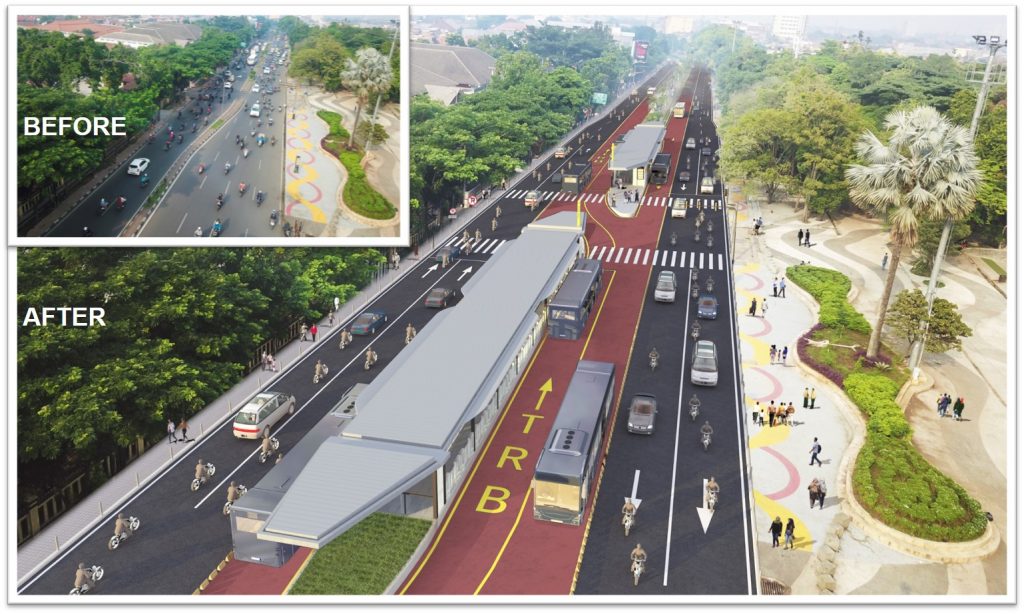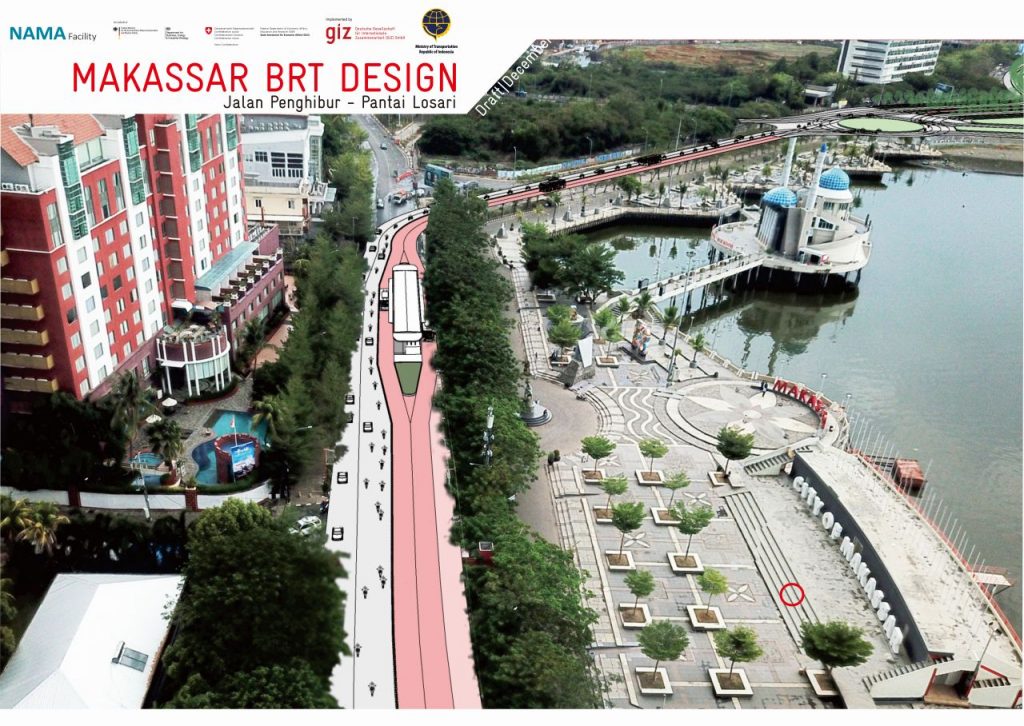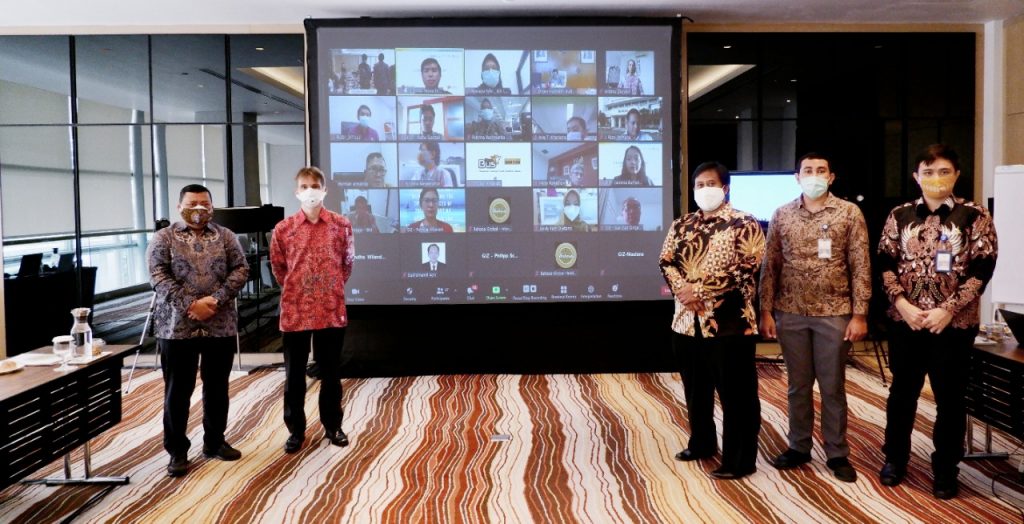
Climate change and global warming are challenges in all countries, including Indonesia. One of the main strategies to mitigate this is the Development of Urban Mass Transport, which has significant economic and environmental benefits. Economic development in Indonesia focuses on infrastructure development, with urban mass transport being one of the national strategic projects, according to Indonesia’s National Medium-Term National Development Plan (RPJMN) 2020-2024.
The national government through the Ministry of Transportation (MoT) has committed to provide full support and assistance on developing public transport systems across Indonesian cities. In this matter, the NAMA Support Project (NSP) Sustainable Urban Transport Programme Indonesia (SUTRI NAMA) and its project component Indonesian Bus Rapid Transit Corridor Development Project (INDOBUS) provides support to local governments in preparing a Feasibility Study (FS) of Bus Rapid Transit (BRT) development in 5 (five) pilot cities, namely Bandung, Batam, Pekanbaru, Makassar, and Semarang. Through a preliminary survey, data collection, and analysis in Makassar and Batam that was concluded in early 2020, the initial plan for BRT development, capital expenditure (CAPEX), and stakeholder analysis for the construction have been identified.
The FS in Bandung Raya and Pekanbaru Metropolitan was concluded in January 2021. Among the key results of the FS are the BRT corridors, service routes, and service coverage. In Bandung Raya, a 23 km of BRT corridor stretching across 169 km of service coverage was agreed upon. On the other hand, Pekanbaru Metropolitan has a 22,5 km of BRT corridor stretching across 99 km of service coverage. Lastly, Semarang has a 12,83 km of BRT corridor with segregated lanes. In addition, cost estimation of the project has also been calculated, which includes the Capital Expenditure (CAPEX) and the Operating Expense (OPEX) for each city.

The results of the Feasibility Study of Bandung Raya were submitted to the Ministry of National Development Planning (Bappenas) to access foreign loans set out in The List of Medium-Term Planned External Loans (Blue Book). The World Bank has indicated their commitment to finance the CAPEX for the BRT development in Bandung Raya while the OPEX will be covered by the local governments. As Bandung Raya is included in the priority are of the 6 metropolitan areas for the Urban Transport Project, that was indicated in the National Medium Term Development Plan (RPMJN) 2020-2024, it is now prioritised to be advanced to The List of Planned Priority External Loans (Green Book). In preparing the operationalisation of the BRT in Bandung Raya, Pekanbaru Metropolitan, and Semarang, a Cooperation Agreement is currently underway, which will be signed by relevant stakeholders in 2021. This stipulated support will be key in the realisation of the project, which is expected to start operation in 2023.
In Makassar and Batam, SUTRI NAMA & INDOBUS joined forces with the Financing Energy for Low-carbon Investment – Cities Advisory Facility (FELICITY) project in supporting the FS development. In early 2021, a workshop was held with the Department of Transportation (Dishub) of South Sulawesi and Dishub of Batam City along with other agencies who are members of the Working Group to kick start the FS for the development and implementation of BRT with segregated lanes in Metropolitan Makassar and Batam. The workshops resulted in the agreement of a project timeline as well as commitment to further discuss other issues such as a series of training programs for relevant stakeholders.

On 22 January 2021, SUTRI NAMA & INDOBUS held its third Steering Committee Meeting, which was attended physically and virtually in Jakarta. It was chaired by the Ministry of Transportation (MoT) of Indonesia, and attended by representatives from the Ministry of National Development Planning (BAPPENAS), Ministry of Finance, Ministry of Public Works and Housing, Ministry of Agrarian and Spatial Plan, and Ministry of Home Affairs as well as SECO as the donor of the project. It aimed to report the progress of project implementation formally to the Steering Committee, officially hand over the Feasibility Study in Bandung and Pekanbaru, and agree on the findings and recommendations resulting from the project activities.

The third Steering Committee Meeting resulted in the agreement of the formation of a technical team across Ministries to discuss the framework of cooperation between the Central Government and Local Governments in implementing BRT projects, which will include participants at the third Steering Committee’s Meeting. The technical team will further discuss and agree on FS results, CAPEX calculation, and division of tasks and responsibilities of each party. Furthermore, it was agreed upon that there will be a meeting with each pilot city to discuss the cooperation agreement that will kick start the development of a BRT system with segregated lanes in the pilot cities.
To further build commitment and create synergies between the Central, Provincial and Regional Governments, the West Java Provincial Government and the governments of five cities and regencies in Bandung Raya or the Bandung Basin Metropolitan Area (BBMA) have signed an MoU on March 2, 2021 in Bandung. The MoU states the mutual commitment, roles and responsibilities of each party in the development of BRT in the Bandung Basin Metropolitan Area, which includes, among others, planning, institutional schemes, development of infrastructure and facilities, financing and operational systems.

Through all of these measures, Indonesia is getting closer to its goal of establishing sustainable, effective, clean, safe and comfortable urban transport.
 © GIZ / SUTRI NAMA & INDOBUS
© GIZ / SUTRI NAMA & INDOBUS
Nabila Fauzia Rahman